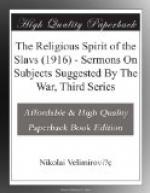With Christ’s coming among the Slavs the balance between good and evil spirits was lost. Quite unlike Perun, Christ was a decisive fighter for good. He showed only one—exclusively one—way, the narrow way leading to the kingdom of good, which is the Kingdom of God, the Highest and the Best, Deus Optimus, not only as a dream of Pagan humanity, but as a provable reality. Although good seems very often to be a weak and losing party in this world, men must not waver but always take cheerfully the part of good. Evil spirits in men and around men are very powerful in this world. Christ Himself was overwhelmed for a time by the evil spirits of this world. But it was only for a time which is now over. It was at the new beginning of the world, so to say, when He came to break the power of Pagan men, hold the balance between the good and evil spirits and to stop the serving of “two masters.” The start was very unpromising; He was trodden down, but He got up and proved Himself the victor. He came now as a victor to the Slavs to make new armies of men, who would consent to undertake His burden, and to go His exclusive way of good, worshipping and serving only one God, His Father and the Father of all men. He came claiming everyone, telling each one “not to be ashamed”—as it is wonderfully expressed in the English Baptism formula—“manfully to fight under His banner, against sin, the world, and the devil, and to continue to be Christ’s faithful soldier and servant unto his life’s end.”
Tolstoi exalted only Christ’s Sermon on the Mount, i.e., only Christ’s teaching, or part of Christ’s teaching. The Orthodox Church exalted Christ himself, as an exceptional, dramatic Person, suffering for good; as a divine hero, fighting against all the evil powers of the world. A teaching or a life drama—i.e., Tolstoi or Orthodoxy! The Church thought: there is something greater than Christ’s words, that is Christ Himself. His words are extraordinary, it is true, no man spoke as He, but His person and His life were more extraordinary still. Thousands of martyrs died for Him, not for the Sermon on the Mount. His words died with His death and came to life again only with His resurrection. The fate of His words was quite dependent on the fate of His person. Consequently His words have been only a shadow of His personal drama, only an inadequate expression of His individuality and His world mission, only the secondary fascination for the coming generation. He himself was the essence of the human drama; He himself—the essence of God and Man; He himself—the incarnated good and the standard of the good in the world’s history. He is incomparably better than Zeus, Jupiter, Wothan or Perun, because He is a reality, a divine reality among men.
The “Petrified” Church.




